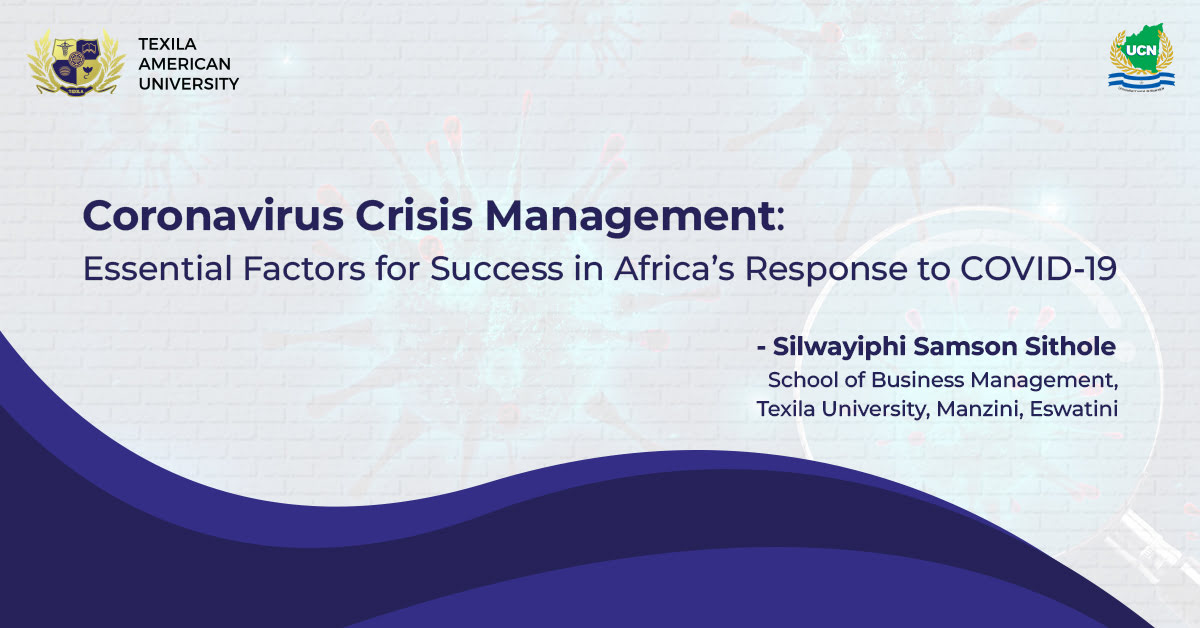|
Tired of Reading? Please listen to the blog
|
Blog Summary
This comprehensive study explores the factors behind Africa’s remarkable success in managing the COVID-19 crisis. Authored by Silwayiphi Samson Sithole, the research investigates key elements like public support, demographics, and healthcare systems. Through rigorous analysis, the study unveils critical insights that could shape future pandemic response strategies in Africa and beyond. By understanding Africa’s resilience, we can better prepare for and mitigate the impact of future health crises. This blog summary sets the stage for an insightful exploration of the dynamics of pandemic management in Africa.
Introduction
After the COVID-19 pandemic, Africa confronted many distinct challenges, including high population density, limited healthcare accessibility, and informal settlements lacking proper sanitation facilities. Despite these hurdles, Africa notably succeeded in mitigating the virus’s impact compared to other continents. Understanding the factors contributing to Africa’s resilience is paramount for shaping future crisis management strategies.
This study, authored by Silwayiphi Samson Sithole from the School of Business Management at Texila University in Manzini, Eswatini, explores the pivotal factors driving Africa’s resilience. It aims to examine elements such as public support, demographic characteristics like a youthful population, and the effectiveness of community health systems. By unravelling these crucial components, this research endeavours to enhance our preparedness to confront and alleviate the repercussions of future pandemics in Africa and beyond.
Background
With its vast landmass and diverse population, Africa faces unique challenges in managing health crises. With a population of over 1.3 billion across 55 countries, Africa’s demographics are characterized by a youthful population and limited resources. Additionally, the continent grapples with issues such as poverty, inadequate healthcare infrastructure, and socioeconomic disparities.
Historically, Africa has faced numerous health challenges, including outbreaks of diseases such as malaria, Ebola, and HIV/AIDS. These pandemics have strained the continent’s healthcare systems and highlighted the need for robust public health strategies.
The emergence of COVID-19 further exacerbated Africa’s healthcare burden. Despite initial concerns due to its high population density, lack of sanitation facilities, and informal settlements, Africa has managed to keep the impact of COVID-19 relatively lower compared to other continents. However, the pandemic has underscored the importance of addressing underlying health inequalities and strengthening healthcare systems across the continent.
Research Problem and Hypotheses
Research Problem: Understanding Africa’s COVID-19 Resilience
Africa’s management of COVID-19 presents a unique paradox: despite facing significant challenges such as high population density, limited healthcare infrastructure, and socioeconomic disparities, the continent has exhibited lower infection and fatality rates than other regions. This phenomenon prompts a critical research inquiry: what factors underpin Africa’s success in mitigating the impact of COVID-19?
Hypothesized Factors
Several hypothetical factors have been proposed to explain Africa’s resilience:
- Public solid Support: Community cohesion and adherence to public health measures.
- Youthful Population: The demographic is skewed towards younger age groups.
- Sparse Old Age Homes: Limited institutionalized care facilities for elderly populations.
- Warm Climate: Potential influence of weather conditions on virus transmission.
- Practical Community Health Systems: Local healthcare infrastructure and response capabilities.
Hypotheses: This study posits that these factors influence the trajectory of COVID-19 in Africa. The hypotheses seek to investigate the relationship between these variables and the observed outcomes of infection and fatality rates on the continent.
Methodology Overview
The methodology employed in this study aimed to comprehensively analyze the factors contributing to Africa’s success in managing the COVID-19 pandemic. It involved a structured research design and approach to investigate the hypothesized variables systematically.
Variables Description
The dependent variables encompassed case infection and case fatality rates, while the independent variables included public support, population age, old age homes, climate, and community health system quality.
Data Collection Methods
Secondary data was sourced from reputable databases like Our World in Data and Worldometer. Data encompassed multiple pandemic waves across African countries, allowing for a longitudinal analysis.
Strata Frame and Data Organization
Countries were categorized into Northern, Equatorial, and Southern hemispheres based on unique climatic conditions. Data was organized according to pandemic wave dates and strata.
Data Evaluation Techniques
Multiple regression analysis, facilitated by Excel, was employed to evaluate how dependent and independent variables relate to one another, offering insights into the factors driving Africa’s COVID-19 resilience.
Results Summary
The study analyzed data at the stratum level to understand Africa’s success in managing COVID-19. Findings reveal varying impacts of independent variables across different regions. Public support emerged as a significant factor in reducing case infection and fatality rates in numerous countries. Conversely, factors like climate and nursing homes showed less consistent influence. These results underscore the importance of community engagement and supportive policies in mitigating the pandemic’s impact.
Analysis of Independent Variables
The study conducted a regression analysis to evaluate how independent factors affect COVID-19 outcomes. Public support consistently and significantly influenced reducing both case infection and fatality rates across multiple countries. Other variables, such as age, climate, and community health systems, showed more mixed results, with some regions exhibiting significant effects while others did not. These findings highlight the multifaceted nature of pandemic management and the need for tailored interventions based on regional dynamics.
Discussion of Findings
The interaction between various factors influencing COVID-19 outcomes in Africa reveals complex dynamics. Public support emerges as a crucial determinant, suggesting that community engagement and effective communication play a pivotal role in combating the pandemic. Additionally, the influence of age, climate, and healthcare infrastructure underscores the importance of considering the regional context in implementing strategies.
Discussion
The study underscores the crucial role of robust public support in mitigating the impact of the pandemic, highlighting its effectiveness in several African countries. Furthermore, the young population demographic emerges as a protective factor, as evidenced by lower fatality rates in countries with a predominantly youthful populace. Interestingly, the scarcity of nursing homes also correlates with lower fatality rates, shedding light on the importance of community-based care models.
Additionally, the study’s findings align with existing literature, reinforcing that Africa’s success in managing COVID-19 can be attributed to a combination of factors unique to the continent’s socioeconomic and environmental context. These insights provide valuable perspectives for future pandemic preparedness and response strategies.
Conclusion
This study delved into the factors contributing to Africa’s success in managing the COVID-19 crisis. Key findings reveal the significant influence of public support, a young population demographic, and the quality of the community health system on mitigating the impact of the virus. These insights have profound implications for future pandemic management strategies in Africa, emphasizing the importance of robust public health infrastructure and proactive community engagement.
Strengthening public health support systems and improving data collection efforts across the continent are recommended to enhance preparedness. Acknowledgement is extended to all contributors, and conflicts of interest are transparently declared, ensuring the integrity and credibility of the study’s findings.
For further details and in-depth analysis, refer to the full article available in PDF format through this link: https://www.texilajournal.com/management/article/2463-corona-virus-19-crisis
References
- African Union. (2021). Africa overview. Retrieved from ( https://au.int/en/overview )
- Worldometers. (2019). Africa population. Retrieved from ( https://www.worldometers.info/worldpopulation/africa-population )
- National Geographic Society. Retrieved from ( https://www.Nationalgeographic.org-encyclopedia )
- World Bank. (2021). World Development Report: Data for better lives. Retrieved from ( https://documents1.worldbank.org/curated/en/248201616598597113/pdf/World-Development-Report2021-Data-for-Better-Lives.pdf )
- Fenollar, F., et al. (2018). Emerging infectious diseases in Africa in the 21st century. New Microbes New Infect, S10-S18. Retrieved from ( https://www.ncbi.nlm.nih.gov/pmc/articles/PMC6205565/ )
- He, W. (2020). Census Bureau, U.S. International Population Reports, Africa Aging: P95/201. U.S. printing office, Washington.
- World Population Review. (2024). Africa Population. Retrieved from ( https://worldpopulationreview.com/continents/africa-population )
- The Borgen Project. (2020). The housing crisis in sub-Saharan African slums. Retrieved from ( https://borgenproject.org/sub-saharan-african-slums )
- Kebede, S. et al. (2010). Trends of major disease outbreaks in the African region. East Afr J Public Health, 7(1), 20-9. Retrieved from ( https://www.ajol.info/index.php/eajph/article/view/6467 )
- Ezeh et al. (2021). The impact of COVID-19 has been lower in Africa. We explore the reasons.
- Mathieu et al. (2020). Corona Pandemic (COVID 19). Published online at OurWorldonData.org. Retrieved from ( http://ourworldinData.org/coronavirus )
- Worldometers. (2020). COVID-19 Situation Update Worldwide. Retrieved from ( https://www.worldometers.info/coronavirus/
- PERC. (2021). Centre of Disease Control and Prevention, Scientific Brief: SARS-CoV-2 Transmission.
- African Development Bank. (2022). Strategy for quality health infrastructure in Africa. Retrieved from ( https://www.afdb.org/sites/default/files/documents/publications/strategy_for_quality_health_infrastructure_in_africa_2022-2030.pdf )
- World Health Organization. (2021). African Regional Report. Retrieved from ( https://www.afro.who.int/sites/default/files/2017-06/african_regional_health_report2006_0.pdf )
- Worldometer. (2023). Age, Sex, Existing Conditions of COVID-19 Cases and Deaths.
- Menebo, M. M. (2020). Temperature and precipitation associated with COVID-19 new daily cases: A correlation study between weather and COVID-19 pandemic in Oslo, Norway. Sci Total Environ, 139659, 1-737. Retrieved from ( https://doi.org/10.1016/j.scitotenv.2020.139659 )
- Thompson, D. C. et al. (2020).








